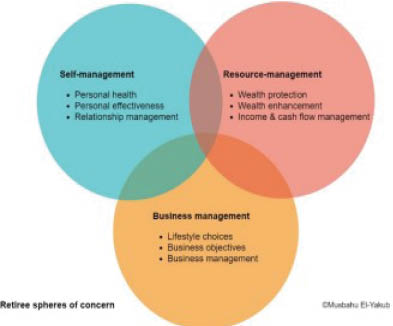Entrepreneurship Success – Retirees going into business (I)
Both the private and public sectors of our economy churn out of employment literally thousands of people in their forties, fifties, and early sixties every year. These are people that retire on statutory grounds, resign voluntarily or otherwise leave paid employment. They are people with good educational backgrounds who have received intensive on-the-job training locally […]

Both the private and public sectors of our economy churn out of employment literally thousands of people in their forties, fifties, and early sixties every year. These are people that retire on statutory grounds, resign voluntarily or otherwise leave paid employment. They are people with good educational backgrounds who have received intensive on-the-job training locally and internationally, as well as garnered decades of experience at organised workplaces. They have built a network of relationships and have a decent asset base to build on.
This group of people can help grow our economy by going into businesses, solving problems, creating jobs and wealth. However, the mindset and practices required to succeed as an employee, both in the public and private sectors, are different from the mindset and practices that are required to succeed as an employer of labour in business. Raising to the middle and top in paid employment should help but is no guarantee for success in business. Yet, it is in these individuals’ and our national interests that these people remain active and continue to contribute to the economy. How can they do it right?
Retirement planning should start the day you start your first job! The best time to start working towards retirement is on the first day of your first job. It may seem far-fetched, but the twenty-five-year-old that starts with this in mind will make completely different and better life decisions than their friend who didn’t. For many of us in our fifties and sixties, we can easily look back at the quantum of resources that we spent on frivolities as well as the opportunities that we took no notice of. Those among us who started with little investments in stock and real estate and seized legitimate opportunities earlier in their paid career are probably doing better pre- or post-retirement.
While you may have lost the opportunities for those early investments, nothing, nonetheless, stops you from enjoying your children and mentees on the need to start retirement planning early. Going forward, you can also do very well given the advantages you have, mentioned above, by doing what is right as follows:
The core objectives: I think the core objectives of the forty-, fifty- and sixty-year-olds leaving paid employment should be built on the tripod of self-management, resource-management, and business management. This is shown in the schematic below.

At my retirement planning training programmes, we cover all the components and more, but for our purposes here we will be focussed only on the aspects to do with going into business.
First, cool-off: I always and strongly advise the just-retired to enjoy a cooling-off period. This should be a time the retiree or the person voluntarily leaving a paid job should take some deserved rest. It is aimed at de-stressing and clearing the head. At the beginning of this period, you shouldn’t even begin to think of what business you will get into. Even if you already have some business on ground, put measures in place to protect it and take a few days, preferably a few weeks, off to rest before you return to it.
The only caveat here is that during the cooling-off period, you must minimise your spendings to ensure that you do not unnecessarily erode your precious savings and investments. At the later part of this period, you can begin to reflect on the issues that you will need to face at the retirement stage of your life which are fundamentally about self-management, resource management, and, if you will, business management.
Mindset changes: Many paid employees, especially at senior levels have little appreciation of the extent to which their organisations support them in ways that the money spent on them is not immediately visible to them. As an employee, you were provided with a conducive working environment and your faulty computer was quickly replaced. When electricity from the public supply goes off, the office generator kicks in immediately. In addition, and beyond the monthly salaries and annual benefits, your organisation might have been providing fuel for your domestic standby generator, a driver, fuel for your official vehicle, perhaps a domestic staff, etc.
The point is it costs your employer so much more than your salaries and other direct financial benefits to maintain you. To sustain the same standard of living, you will need to generate that extra income and cash flow. If you already have it, well fine and good. If you don’t, you will need to build the new mindset that will see you through this stage of life.
Consider your options: As mentioned above, our work experiences have provided us with many advantages and also exposed us to opportunities. If we have already identified what we would want to do, we should review that option in greater detail after our cooling off period. If we haven’t yet, our knowledge, experiences and network of relationships can help direct us. For instance, in one of my places of work, I was responsible for a massive volume of importation and clearing of equipment, spare parts, raw materials and other supplies. I understood the clearing process and system very well and knew literally everyone that mattered in the logistics industry in Nigeria. I could so easily have started a successful clearing agency. But I didn’t because I already had a computer business that was doing well before I left my paid employment. So, I just continued with that almost seamlessly. I know a senior who has been in the insurance industry all his working career. Now in retirement, he remains active and successful in various parts of the insurance value chain. What have you done? Can you make a business out of it?
But do not limit your thoughts on options and possibilities. Listen to people but make no commitment. It is after your interest is aroused that you can begin to narrow your options down to study specific possibilities deeply. Yet, beyond interest, you have to establish the commercial viability of a business proposition before you get into it.
Our retirees have experience, a network of relationships, a decent asset base, and a DNA for success. We need them to go into business and continue to contribute to the growth of the economy for at least a decade more. We will continue next week with other specific actions that you will need to take going into business after leaving employment.
